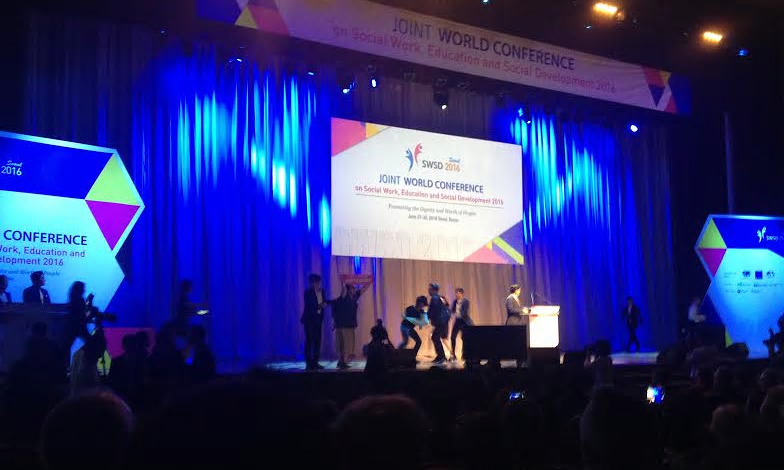Disabled people stage protest at world social work conference
International conference in Seoul halted when people took to the stage during health minister’s speech to protest against disability rating system

Protesters on stage at a social work conference in Seoul. Photograph: Ruth Hardy
Disabled protesters have been forced out of an international social work conference in Seoul, South Korea, after they took to the stage when a minister was speaking.
The protest took place on the first day of the biannual Social Work and Social Development conference. As Korean health and welfare minister Chung Chin-Youb started speaking, protesters – some in wheelchairs – took to the stage and shouted in Korean and English, saying: “No more disability rating system.”
The protesters were forcibly removed – some screaming – from the hall by security guards.
The disability rating system in South Korea categorises disabled people on a six-point scale, which dictates the benefits and support they get from the state. In 2014, the government scrapped plans to simplify the controversial system.
But the opening ceremony was interrupted by a member of the audience, who pointed out the conference’s theme of dignity and worth for all people, and said the protest had been a manifestation of people who wanted dignity. The social work leaders were asked for a response. This request was met by applause in the audience.
Ruth Stark, president of the International Federation of Social Workers, responded by saying: “Like many people in this room, I saw a demonstration by people who use services who wanted to be heard. I think one of the messages from the report we have just published is that is what is wanted throughout the world, that people who use our services want to be heard.
“We have to create an environment, and it is our responsibility as well as the people who want to be heard, to create that dialogue. One of the themes that came out from every region across the world was that working together with people to influence policies, to getting resources, to recognising that every person has to be treated with dignity and respect; that is what we as social workers and those working in this field are giving our days, our years, our lifetimes to in promoting the dignity and worth of all people. We heard the demonstration, we saw the demonstration, we need to work out how people can be heard without having to do it in such a way as we heard happen today.”
Join the Social Care Network to read more pieces like this. Follow us on Twitter (@GdnSocialCare) and like us on Facebook to keep up with the latest social care news and views.
 [비마이너] 세계사회복지대회 폐회식 공식 발언
[비마이너] 세계사회복지대회 폐회식 공식 발언
 [비마이너] 2016 세계사회복지대회 기습시위
[비마이너] 2016 세계사회복지대회 기습시위

















